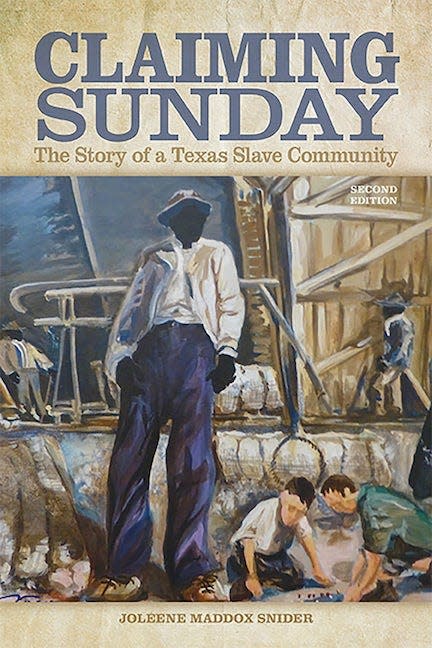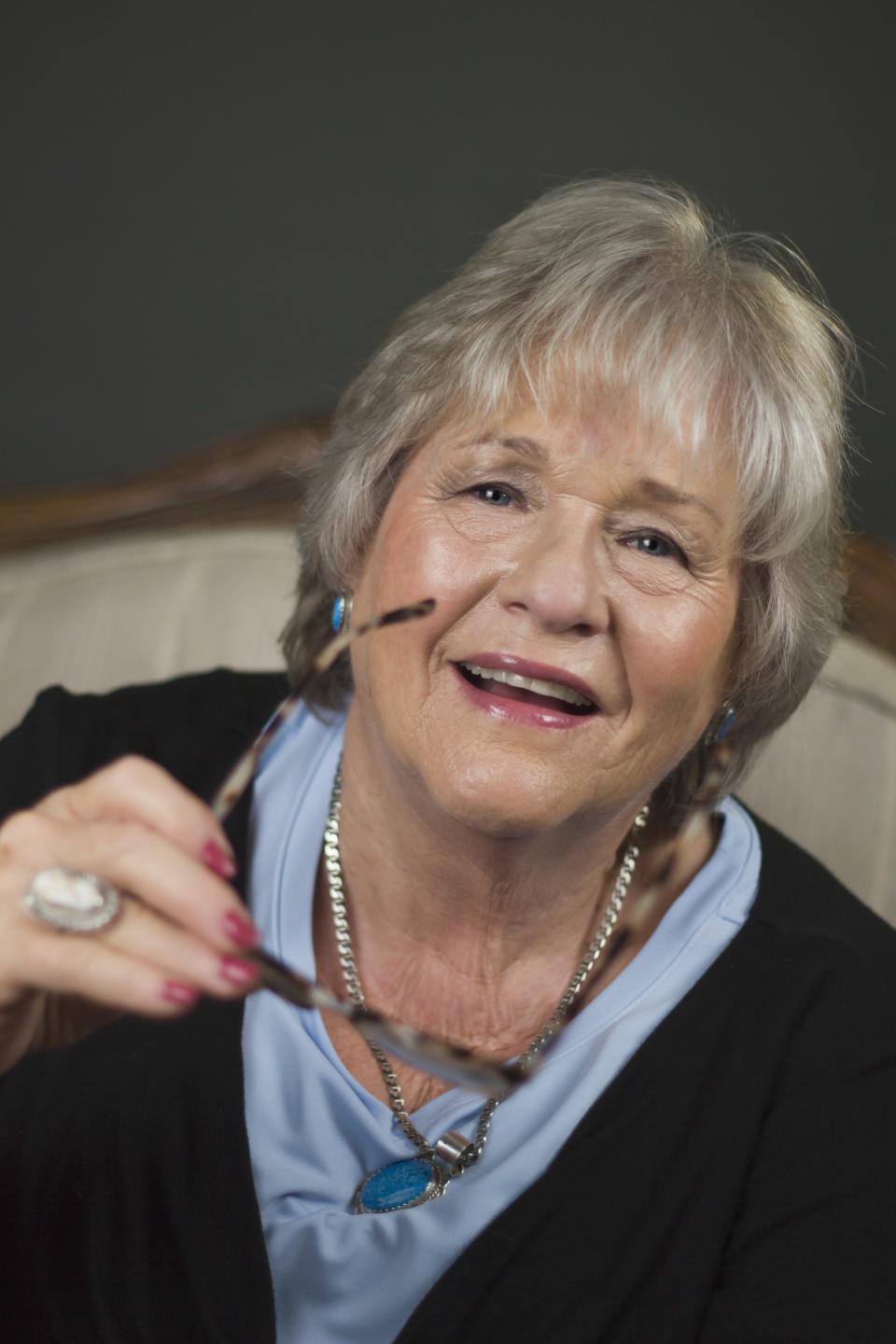Good reads about Texas: A San Marcos book club plunges into literature about the state

- Oops!Something went wrong.Please try again later.
Not long ago, I stumbled onto a book club after my own heart.
The Texas and Western Literature Book Club, sponsored by Life Long Learning in San Marcos, has read and discussed more than 30 Texas books since the summer of 2020.
Soon, they plan to read books more generally about the West, starting with "Centennial," a thick novel set in Colorado by James A. Michener, who spent his final years in Austin.
Almost every author on the club's Texas reading list has been discussed in this column.
More:Texas history: On second thought, make that 60 essential books about our state
The club's leader, Joleene Maddox 'Jo" Snider, a retired Texas State University professor, asked me to help wrap up their chat on Texas books via Zoom on Feb. 8.
I talked about which Texas authors were eyewitnesses to history, which were alternately myth-makers or myth-busters, and those who integrated those older elements into authentically fresh voices for the state.
Snider wrote one of the books that the club read, "Claiming Sunday: The Story of a Texas Slave Community," a fantastic history recently released in a revised edition by TCU Press. Trained as a historian, she earned her master's degree at Texas State with a breakthrough revisionist thesis on slavery, then she made three tries at a Ph.D. at the University of Texas
Snider: "I claim they should have given me the damn degree for perseverance, but they didn’t agree."
How did the book club come to be?
The Life Long Learning program is the brainchild of Marianne Reese, a retired professor of education. The city of San Marcos and the Retired Faculty and Staff Association of Texas State University sponsor the classes, which resemble those at the lifelong learning institute at UT.
"I started the book club as a way to give something back to the LLL program," Snider says. "Usually, they pay their instructors for the courses, however, I do the book club for free. ... I did not expect it to last more than a few months, but it has attracted a dedicated, devoted core of about six to 10 people who did not want to quit."
Snider picks the books, does some historical and literary background and opens the group talks.
"I’m older, a native Texan with lots of stories and experiences in things Texas," Snider says about the club's subjects so far, "and years to kick around the historical field in the state."
More:Texas History: Pick up these prime books about our Lone Star State
Over the years, she became acquainted with — or at least met — the state's top literary talent, including Bill Wittliff, Bud Shrake, James Michener and Larry McMurtry. She met the author of "Lonesome Dove" at his sprawling bookstore in Archer City.
"Walked head first, literally, into McMurtry in Booked Up one summer," Snider says. "Great example of thinking fast on my feet, all I could say was, 'What are you doing here?' He replied, 'It’s my bookstore.'"
More:Readers pitch their favorite Texas books
Snider took a break from the club in the fall to get the second edition of "Claiming Sunday" into shape.
"My regulars were an unhappy bunch," she says, "so I told them I would consider resuming after the first of the year. Mainly, I thought I could do a credible job with the west or the south, and I needed a change. We had a vacation home in New Mexico for years, so some personal knowledge, book cub was receptive — so to the west we go."

The book club leader's excellent book
"Claiming Sunday" tells the story of a former slave community in Northeast Texas that, despite a catastrophic split of the core enslaved family in the 1840s, survives with its identity intact into the present. Much of the book is based on the Devereux Papers, an extraordinarily detailed record of its white and Black community members. Yet Snider adds interviews with descendants, incisive analysis, highly informed context and up-to-the-minute insights into how slavery affected individual lives.
Snider came across the Devereux Papers in 1990 at UT's Briscoe Center for American History. She wrote a research paper that she turned into an article for Southwestern Historical Quarterly in 1994 about Sarah Devereux, wife and then widow of the principal enslaver, Julien Devereux.
Texas history, delivered to your inbox
Click to sign up for Think, Texas, a newsletter delivered every Tuesday
"No historian ever got more mileage out of one article," Snider jokes. "That piece is still in print in several anthologies. But I realized at the time that the real story was in the slave community. I started working on it then in fits and starts. Pushing it back and bringing it forward on my desk for years."
After Snider retired in 2001, it still took her 18 more years to deliver it to print in a self-published version.
"What I realized going into the Devereux Papers was that I could actually get into the enslaved's lives by going through white records," Snider says. "Marginalized, enslaved souls could and did speak for themselves. Historians just had to learn how to listen.
More:Make time to browse the exhibitor tents, too, at the Texas Book Festival
"The enslaved people didn’t leave extant documents; they told their story in coded, nuanced, subtle ways and my role was to learn to decipher what they were saying. I’ve read in the field of American slavery for over 50 years, but very few books really told me much about the individuals or gave me details about their lives. Historians tend to strip mine records for lots of quotes and info, but little that goes in depth into slave lives."
Snider also wanted her book to be approachable and readable.
"All those history books over so many years I’ve read have all been highly literate, well written, copiously footnoted, bibliographies longer than my arm," she says, "and dull as dirt."
Snider thinks that scholars in the history field spend way too much time preaching to the choir.
"If the theory that we learn history to avoid repeating the mistakes of the past has any validity at all, then it follows that we should be writing books that real people, not just historians, read," Snider says.
TCU Press certainly got it. The handsome paperback revised edition includes the expressive art of Bob Jones, as well as Snider's own writing style that is anything but "dull as dirt."
"I made some significant changes," Snider says. "The first edition was like a rough draft. Of course, having professional editors was really beneficial to polishing everything up. I have never worked as hard in my life as I did the four months I was doing the revisions."
She said the most important changes were structural, including changing the format and adding an introduction and five new interviews. "Don’t read the first edition," she says. "This edition is a much better book."
How to read surviving records from the slavery era
The Devereux Papers are a good source on the lives of enslaved people, but by no means the best in Texas. The archival materials for Peach Point Plantation near Jones Creek are probably the largest collection.
"Emily Austin Perry was Stephen F. Austin’s sister and Peach Point was about as close to a home in Texas that Austin had," Snider says about the leader of the American colonists in Texas. "There are other sets of records that are very complete and useful. Texas is rich in extant material for more work on Texas slavery. In fact, so is the entire South."
More:10 gift books for people who love Texas culture
Very few historians have examined particular records as closely as Snider has the Devereux Papers. She has examined every word with a historian's eye, but also draws conclusions with an empathetic heart.
"There were times I would be so immersed in the material I would have to mentally struggle to climb back up into the real world and my place in it," Snider says. "It required finding common ground with the ancestors and the descendants who gave me so much insight into their ancestors. The descendants were the keys to bridging the span of time between then and now."
Michael Barnes writes about the people, places, culture and history of Austin and Texas. He can be reached at mbarnes@gannett.com. Subscribe to Think, Texas, a free weekly digital newsletter, at statesman.com/newsletters, or at the newsletter page of your local USA Today Network newspaper.
Reading List: Texas and Western Literature Book Club
This club, sponsored by Life Long Learning in San Marcos, read and discussed the following Texas books from the summer of 2020 to the winter of 2023. Recently, they moved on to more general Western literature, starting with James Michener's "Centennial."
"Texas Literary Outlaws," Steven L. Davis
"The Which Way Tree," Elizabeth Crook
"Lonesome Dove," Larry McMurtry
"Charles Goodnight," J. Evetts Haley
"Black Water Rising," Attica Locke
"The Injustice Never Leaves You," Monica Muñoz Martinez
"Thursday Night Lights," Michael Hurd
"The Time It Never Rained," Elmer Kelton
"Pale Horse, Pale Rider," Katherine Anne Porter
"The Gates of the Alamo," Stephen Harrigan
"God Save Texas," Lawrence Wright
"George Washington Gomez," Americo Paredes
"The Wind," Dorothy Scarborough
"Adventures with a Texas Naturalist," Roy Bedichek
"Coronado's Children," J. Frank Dobie
"Goodbye to a River," John Graves
"Olympus, Texas," Stacey Swann
"Sam Houston," James L. Haley
"Color of Lighting," "News of the World," Paulette Jiles
"Liar's Club," Mary Karr
"Blood and Money," Thomas Thompson
"Blood Will Tell," Gary Cartwright
"Isaac's Storm," Erik Larson
"Kings of Texas," Don Graham
"Claiming Sunday," Joleene Snider
This article originally appeared on Austin American-Statesman: Great Texas reads: San Marcos book club has recommendations

